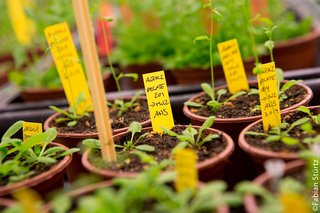A new study provides insights into how a family of immune proteins in plants confers disease resistance. The study builds on previous research by the same research group which highlighted the structural similarities of this protein family between plant and animal immune systems. The study led by Dr Takaki Maekawa at the University of Cologne’s Institute for Plant Sciences and the CEPLAS Cluster of Excellence on Plant Sciences was published in the journal Cell Host & Microbe under the title “Cytoplasmic calcium influx mediated by plant MLKLs confers TNL-triggered immunity”.
Both plants and animals face the challenge of having to protect themselves against harmful microorganisms, despite their differences in physiology, habitat and nutritional requirements. The research group has now identified a new biochemical function of a plant protein family that is similar to so-called mixed lineage kinase domain-like proteins (MLKLs), which induce programmed cell death in animals by damaging the plasma membrane. In this latest study, the team delved deeper into the functionality of plant MLKL proteins. Their findings suggest a crucial role for these proteins in regulating the calcium ion concentration inside the cells, which is responsible for innate immune responses, mirroring potential functions of animal MLKLs.
The authors first showed that when stress-inducing so-called nicotinamide adenine dinucleotide hydrolases (NADases) – enzymes that plants use to generate signalling molecules – are activated, plant MLKL proteins labelled with green fluorescent protein (GFP) cluster into small dots at the plasma membrane in the model plants Arabidopsis thaliana and Nicotiana benthamiana. This demonstrates that the observed clustering is a general phenomenon in plants. Further investigation revealed that the EDS1-SAG101 scaffold protein complex is required for the dot formations of plant MLKL proteins when signalling molecules are produced. In addition, activated plant MLKLs are required to maintain higher cytoplasmic calcium ion levels in response to bacterial attack. It is likely that the MLKL-mediated increase in cytoplasmic calcium ion concertation further activates the downstream immune machinery.
The plant mutant without functional MLKL is shown to be highly sensitive to filamentous pathogens, such as powdery mildew, compared to bacterial pathogens. This observation suggests that MLKLs play a nuanced role in plant immunity, but vary depending on the mode of pathogen infection.
In future studies, the researchers aim to discover the molecular details underlying the function of plant MLKLs that explain the varied sensitivity of mutant plants to different pathogen types. The aim of the new project is to investigate how MLKLs regulate immunity in the tissue context, both spatially and temporally, and how this activation leads to effective plant protection against pathogen attacks. Finally, this study revealed a number of common regulatory processes for the activation of plant and animal MLKLs, while how activated animal MLKL induces plasma membrane damage remains incompletely characterized. As this study shows that activated plant MLKLs regulate calcium ion concentration, one would expect an animal MLKL function in regulating calcium ion homeostasis.
The research was carried out in the framework of Collaborative Research Centre 1403: Cell Death in Immunity, Inflammation and Disease at the University of Cologne and involved senior author Dr Takaki Maekawa, with doctoral researchers Qiaochu Shen and Keiichi Hasegawa as co-first authors. The collaborators also include Professor Dr Kay Hofmann at the University of Cologne’s Institute of Genetics and Humboldt-Professor Dr Jijie Chai at the University of Cologne and the Max Planck Institute for Plant Breeding Research, as well as Professor Dr Jane E. Parker at CEPLAS and the MPI for Plant Breeding Research.
Media Contact:
Dr Takaki Maekawa
Institute for Plant Science, CEPLAS Cluster of Excellence on Plant Sciences
+49 221 4708 9090
tmaekawauni-koeln.de
Press and Communications Team:
Jan Voelkel
+49 221 470 2356
j.voelkelverw.uni-koeln.de
Publication:
https://www.cell.com/cell-host-microbe/fulltext/S1931-3128(24)00059-3
Further information:
Cluster of Excellence on Plant Sciences - CEPLAS
